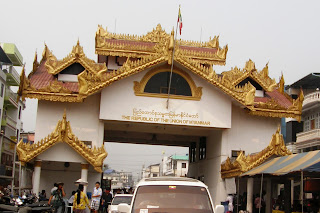It’s an interesting time to be here. As you
may or may not know, Burma held by-elections last Sunday, April 1st. These are
the first elections since the General Election of November 2010, which marked
the beginning of Burma’s current period of reform. The 2010 elections, however,
have been widely regarded as a sham. The military junta that had ruled the
country for nearly 50 years, ceded power to a new, nominally civilian
government, that is full of retired, ex-military Generals. Hardly a significant
power shift. The by-election earlier this month offered up 44 seats out of 600,
a very small number, and not enough to hold much influence. Daw Aung San Suu
Kyi’s party, the National League for Democracy, won 43 of these, and Daw Suu is
due to take her seat in parliament for the first time on April 23rd. However, there are widespread reports of ballot fraud, for example, waxing voting papers so they couldn't be marked, peoples names mysteriously missing off electoral roles, and serious intimidation in the lead-up to election day.
There is no doubt that these elections are an incredible
achievement for Burma, and a step towards democracy in a very big way.
However, it is worrying that the international community is being so quick to
reward the Burmese government by lifting sanctions, investing and so on. While
there is no doubt that things are changing, Burma is still a heavily oppressed
nation. The government still uses rape as a weapon of war, it still uses forced
labour – it has said it will cease this practice by 2015, three years away –
forced relocation is still a significant issue, ethnic conflicts continue to
rage, and life in the border regions remains miserable for hundreds of
thousands of people. The NLD, while an inspirational party, don’t represent all
the people of Burma. Ethnic minorities are sorely misrepresented in the Party,
which is primarily made up of ethnic Burmans. And it is these ethnic areas
where human rights abuses are most flagrant. Freedom of speech is slowly
improving, but it is still illegal to speak out openly against the government - Daw Suu’s victory speech was heavily censored. Landmines continue to be laid, and political prisoners continue
to be arrested and have their rights violated. Take, for example, the most
recent briefing from the Assistance Association for Political Prisoners, based
here in Mae Sot:
Mahn Nyein Maung, an ethnic Karen
leader, was sentenced to life plus three years this month for unlawful
association and treason and released six days later. U Gambira, monk leader of
the 2007 protests released as part of the January presidential order, was
re-arrested for the second time since his release and was detained for a day
and interrogated for hours. Such interrogation can have fatal consequences, as
in the case of a 19 year old Shan woman, who fell to her death from a fifth
story window after days of relentless interrogation and intimidation by the
Bureau of Special Investigation (BSI).
Meanwhile, the situation in Kachin
State has not improved, as reports of forced labour, abductions and other human
rights abuses continue to come out. The sentencing of a farmer to 3 months of
hard labour for refusing to move from their land to make way for a state
development project is further evidence that protecting the rights of citizens
is secondary to the interests of the state.
It’s strange being here right now: learning
about these things first hand from the people that are suffering through them,
while the rest of the world looks on with approving nods at the alleged changes
being made. The government had absolutely nothing to lose in these elections,
44 seats is not enough to effect any change, but it undoubtedly improves the
international community’s view of the country. A pretty ingenious move if you ask me. Burma was ruled by a vicious
military junta for 50 years. It takes more than just 16 months to undo all that.
The struggle here is still so strong,
yet international
NGOs are pulling funding on the border all over the show, in favour of
aid
inside Burma. While this is also needed, there needs to be a transition period; the border and the few hundred
thousand displaced people that live here are still suffering
unimaginable
hardships. International attention is shifting away from the very real
needs here, and is instead favouring the new, exciting and somewhat
deceptive developments inside. I went to Burma again for a few hours last Wednesday
to do a visa run, to the town of Myawaddy just over the border (the border only
opened up in December last year, after nearly two years of being closed). It
was inspiring to see the NLD HQ in town, and it made me very sad to think about
leaving. I have just two weeks left here before moving on to Melbourne and
(hopefully) a paid job for a while, and while I am really excited to be going somewhere new, there is still so much to stay for.
Here is an article from the Washington Post discussing some of the things that are happening in Kachin State right now, and why lifting sanctions and international pressure is a terrible idea.
Here is an article from the Washington Post discussing some of the things that are happening in Kachin State right now, and why lifting sanctions and international pressure is a terrible idea.

No comments:
Post a Comment